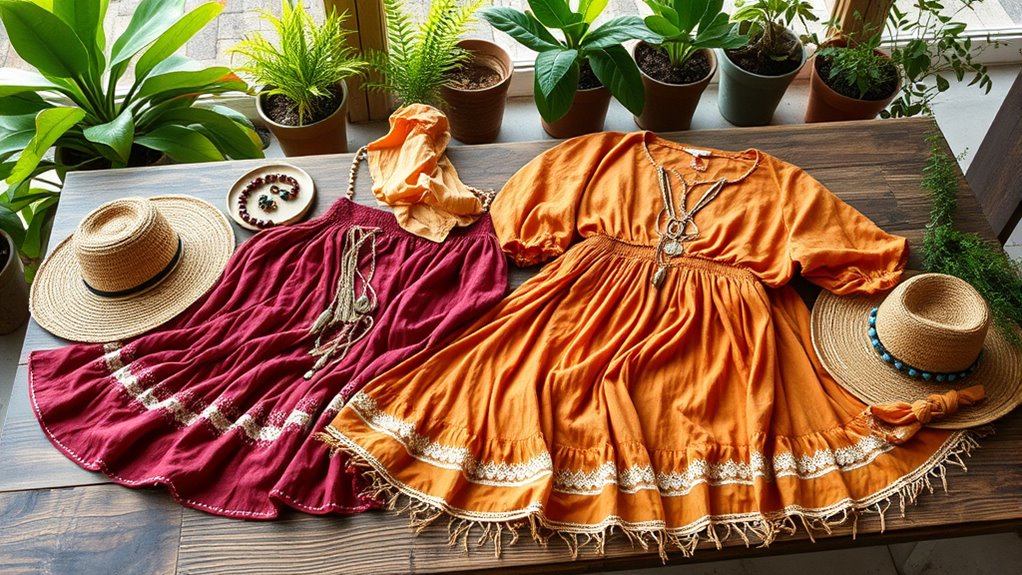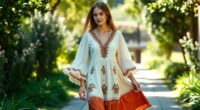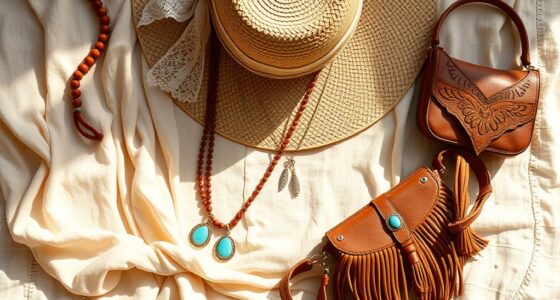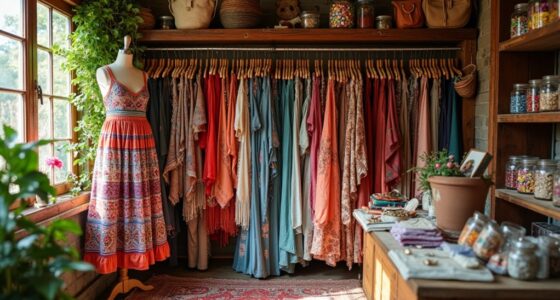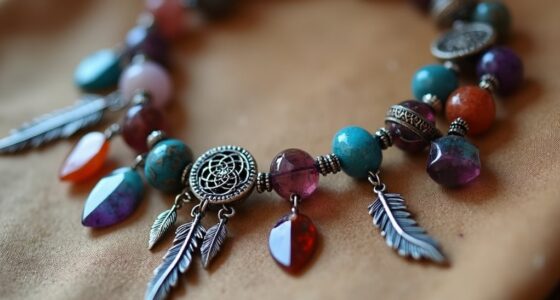Discover stylish, eco-friendly boho fashion by choosing natural and organic fabrics like organic cotton, linen, hemp, and bamboo. Top brands such as Reformation, Pangaia, and Tonlé focus on transparency, fair trade, and sustainable materials. You can also explore vintage, upcycled, and second-hand pieces to reduce waste and support responsible fashion. By investing in versatile, timeless pieces from ethical brands, you can build a conscious wardrobe that lasts. Keep exploring to uncover more sustainable style tips.
Key Takeaways
- Prioritize natural, biodegradable fabrics like organic cotton, linen, hemp, bamboo, and Tencel for sustainable boho fashion.
- Support brands such as Reformation, Spell & The Gypsy, Pangaia, and Tonlé that focus on recycled textiles and ethical practices.
- Shop vintage, upcycled, and second-hand pieces to reduce textile waste and promote unique, eco-friendly styles.
- Choose transparent, fair trade-certified brands with eco-conscious manufacturing to ensure responsible supply chains.
- Embrace future trends like biodegradable materials, natural dyes, and innovative fibers for long-lasting, sustainable boho looks.
Embrace Natural and Organic Fabrics for Eco-Friendly Style
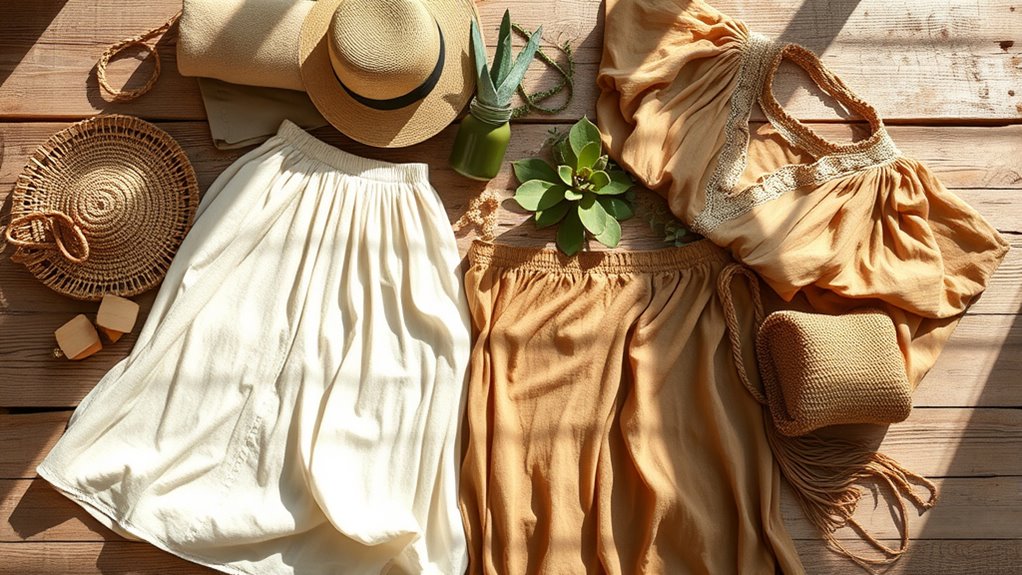
Choosing natural and organic fabrics is a simple way to make your boho wardrobe more sustainable. By opting for organic fabrics like organic cotton, linen, hemp, bamboo, and Tencel, you embrace sustainable materials that are biodegradable and eco-friendly. These natural fabrics help reduce environmental impact compared to synthetic options. Organic cotton is grown without harmful pesticides and fertilizers, offering softness and breathability, perfect for ethical fashion. Linen, made from flax, requires fewer resources and is ideal for lightweight summer styles. Hemp is highly sustainable, needing minimal water and no pesticides, making it an eco-friendly clothing choice. Bamboo fabric, processed responsibly, is moisture-wicking, biodegradable, and adds comfort to your boho looks. Incorporating these natural fabrics supports a conscious wardrobe rooted in sustainability. Additionally, Vetted options like flat iron bikes demonstrate the importance of choosing reliable and eco-conscious transportation alternatives to complement your sustainable lifestyle, especially when considering bike maintenance to extend their lifespan and reduce waste. Sustainable fabrics are also often produced with ethical manufacturing practices, ensuring fair labor conditions and environmentally friendly processes. Moreover, choosing brands committed to sustainable sourcing can further enhance the eco-friendly impact of your wardrobe. Using a variety of aesthetic wall organization solutions, you can create a harmonious and eco-friendly living space that reflects your values.
Highlighting Leading Brands Committed to Sustainability and Ethical Practices
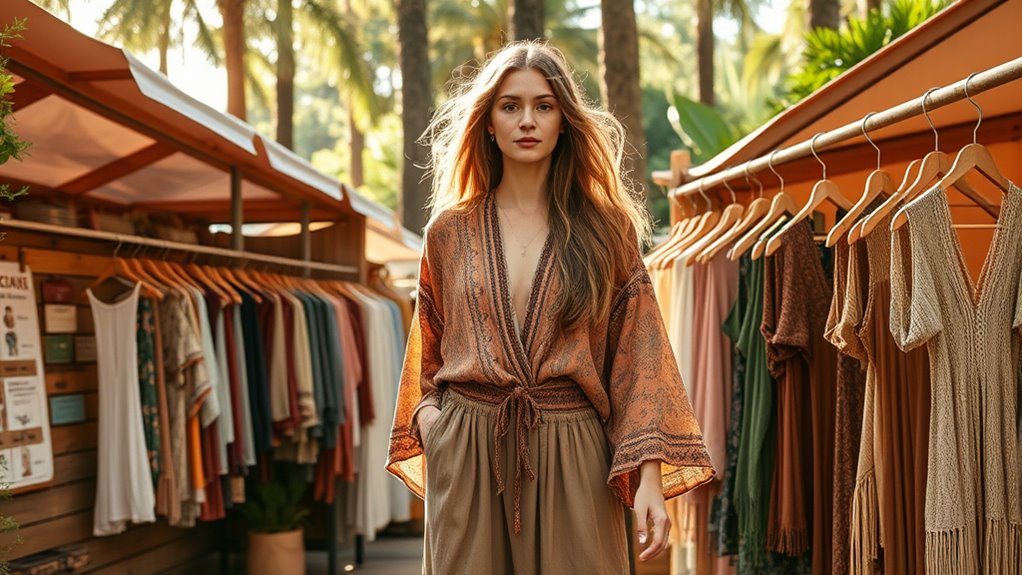
Many leading boho brands prioritize ethical production practices and sustainable materials to reduce their environmental impact. You’ll find that companies like Reformation and Patagonia use recycled fabrics and hold certifications that verify their commitment to transparency and fair labor. By choosing these brands, you support a fashion industry that values both style and sustainability. Additionally, some brands incorporate eco-friendly building materials into their supply chains, further emphasizing their dedication to environmental responsibility. Incorporating vetting processes ensures that these brands maintain high standards of sustainability and ethical labor practices throughout their supply chains. Understanding the environmental impact of different fabrics can help consumers make more informed choices and support truly eco-conscious brands.
Ethical Production Practices
Leading brands in sustainable boho fashion like Reformation, People Tree, and Patagonia set a high standard by maintaining transparent supply chains and ethical labor practices. They prioritize ethical manufacturing by ensuring fair wages, safe conditions, and environmental responsibility. These brands source low-impact fabrics and uphold certifications like GOTS, Fair Trade, and B Corp to verify their adherence to strict social and environmental standards. Transparency is key, with traceability measures providing consumers detailed insights into sourcing and production. This commitment promotes sustainability from start to finish, embodying slow fashion principles and local manufacturing. Additionally, many of these brands actively engage in sustainable sourcing initiatives to further reduce their environmental impact. Incorporating ethical production practices not only supports fair labor but also encourages a more conscious fashion industry, fostering industry transparency and consumer trust. Emphasizing supply chain transparency can further strengthen trust and accountability within the industry. Moreover, adopting innovative eco-friendly fabrics helps reduce the environmental footprint of fashion production, aligning with the movement toward sustainability.
Sustainable Material Use
Sustainable material use is at the heart of ethical boho fashion, with brands like Reformation, People Tree, and Patagonia leading the way by prioritizing eco-friendly fabrics. They focus on materials such as:
- GOTS-certified organic cotton, which reduces pesticide use and supports ethical sourcing.
- Recycled polyester, which repurposes waste and minimizes water consumption.
- Sustainable fabrics like hemp, Tencel, and bamboo, known for minimal resource needs and biodegradability.
- Reclaimed or upcycled textiles from brands like Tonlé and H&M Conscious, reducing textile waste.
These brands emphasize transparency, sharing sourcing details and certifications like GRS, Fair Trade, and Bluesign. Additionally, innovative eco-friendly textiles are continually being developed to further reduce environmental impact. For instance, ongoing research into sustainable fabric innovations aims to create even more eco-conscious options for fashion. By choosing these eco-friendly materials, you support a more sustainable and ethical fashion industry.
Discover the Charm of Upcycled and Vintage Boho Pieces
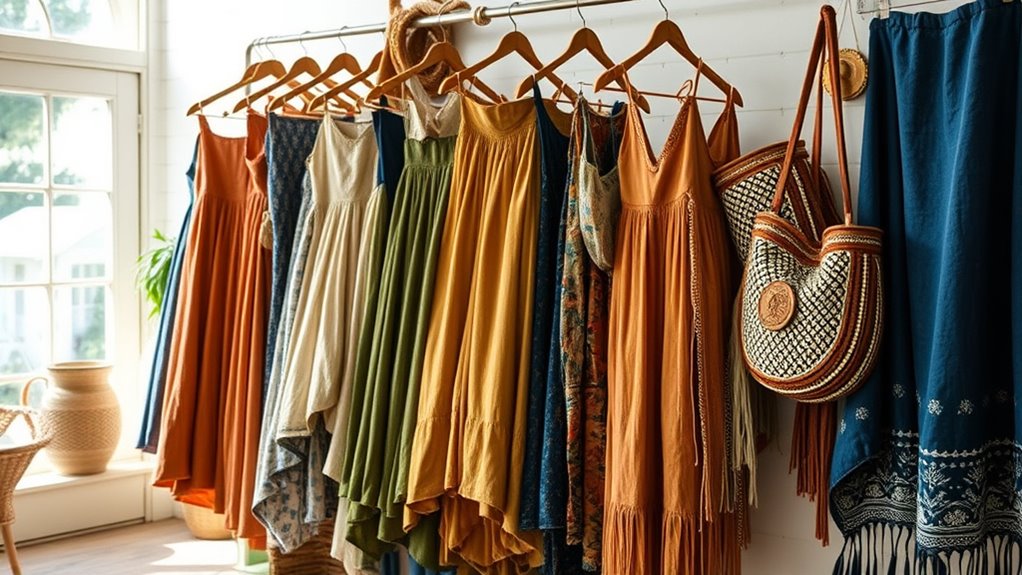
Discovering the charm of upcycled and vintage boho pieces allows you to embrace unique style while supporting eco-friendly fashion. Upcycled garments transform old fabrics into new, one-of-a-kind pieces, reducing textile waste and landfill contributions. Vintage boho items often showcase intricate craftsmanship, rare fabrics, and timeless appeal, extending the lifecycle of garments and promoting sustainable fashion. Purchasing second-hand from platforms like Depop, Poshmark, and Etsy lowers environmental impact by avoiding new production and conserving resources. Creative upcycling techniques, such as repurposing textiles into accessories or altering vintage styles, boost individuality and eco-consciousness. Additionally, embracing sustainable fabrics and other materials used in crafting can also be sustainable, further enhancing eco-friendliness. Incorporating eco-friendly fabrics into your wardrobe helps reduce reliance on environmentally taxing materials and promotes sustainable textile practices. Using upcycled textiles not only minimizes waste but also encourages innovative fashion design. Exploring options for merchant services can make purchasing vintage and upcycled pieces more seamless and secure for consumers. Plus, vintage and upcycled boho pieces are often more affordable than new sustainable options, making responsible consumption more accessible without sacrificing style.
Understand the Importance of Fair Trade and Supply Chain Transparency
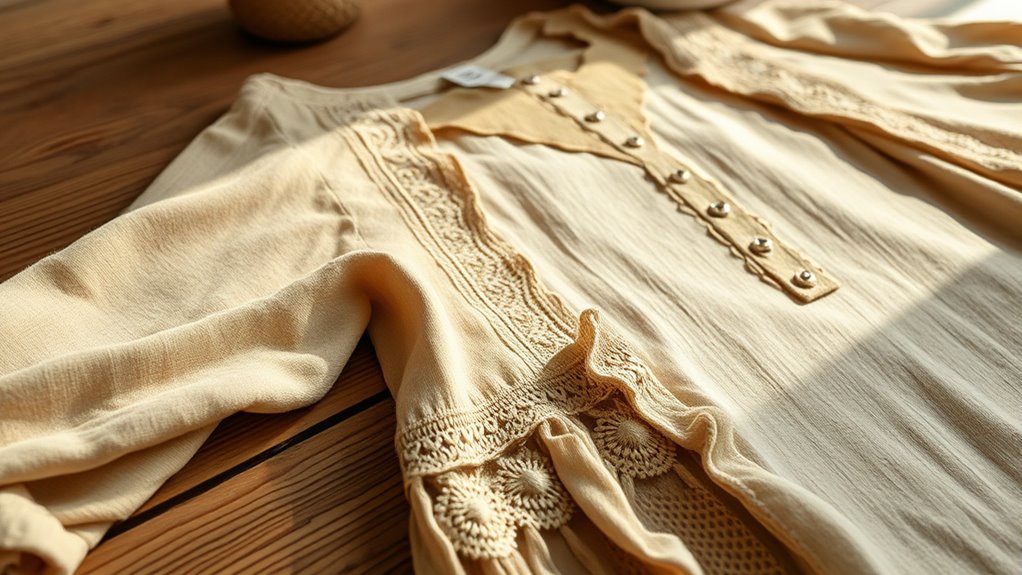
Understanding fair trade and supply chain transparency helps you make more ethical fashion choices. When brands share where and how their clothes are made, you can trust they follow fair wages and safe working conditions. Supporting transparent practices encourages accountability and reduces exploitation in the industry. Being aware of product ingredients and the origins of materials, like eco-friendly fabrics, further supports sustainable fashion efforts. Incorporating knowledge about craftsmanship and sourcing practices can empower consumers to choose brands that prioritize ethical production. For example, knowing that some brands collaborate with local artisans or prioritize traditional regional techniques can deepen your appreciation for ethically made clothing. Developing Cultural Intelligence enables consumers to better understand the cultural significance behind traditional crafts and sourcing methods, fostering greater respect and informed choices. Recognizing the importance of supply chain transparency can also help consumers identify brands that actively work to improve industry standards and environmental impact.
Ethical Manufacturing Practices
Ethical manufacturing practices are essential for ensuring that your clothing supports fair treatment of workers and minimizes environmental impact. When brands prioritize ethical manufacturing, they focus on: 1. Obtaining fair trade certifications to guarantee fair wages and safe working conditions. 2. Maintaining a transparent supply chain so you can verify where and how garments are made. 3. Using environmentally responsible methods, like GOTS-certified fabrics, to reduce ecological harm. 4. Earning B Corp certification, demonstrating a commitment to high social and environmental standards. Incorporating transparency in materials helps consumers make informed choices and supports sustainable fashion practices. Additionally, understanding Gold IRA Rollovers can provide insight into diversifying investments for long-term financial security.
Transparent Sourcing Processes
Transparent sourcing processes are crucial for ensuring that your clothing choices align with your values. When brands share details about their supply chain, such as factory locations, labor practices, and material origins, they demonstrate transparency and commitment to ethical production. Certifications like fair trade or GOTS verify that brands meet strict social and environmental standards, supporting fairness and sustainability. Supply chain transparency allows you to make informed decisions, knowing exactly how and where your clothing is made. Brands that prioritize transparency often conduct regular audits and publish sustainability reports, showing accountability and dedication to responsible manufacturing. With 73% of consumers willing to pay more for transparent practices, embracing brands with open sourcing processes helps promote sustainable fashion and supports fair trade initiatives.
Invest in Timeless, Versatile Pieces for a Long-Lasting Wardrobe
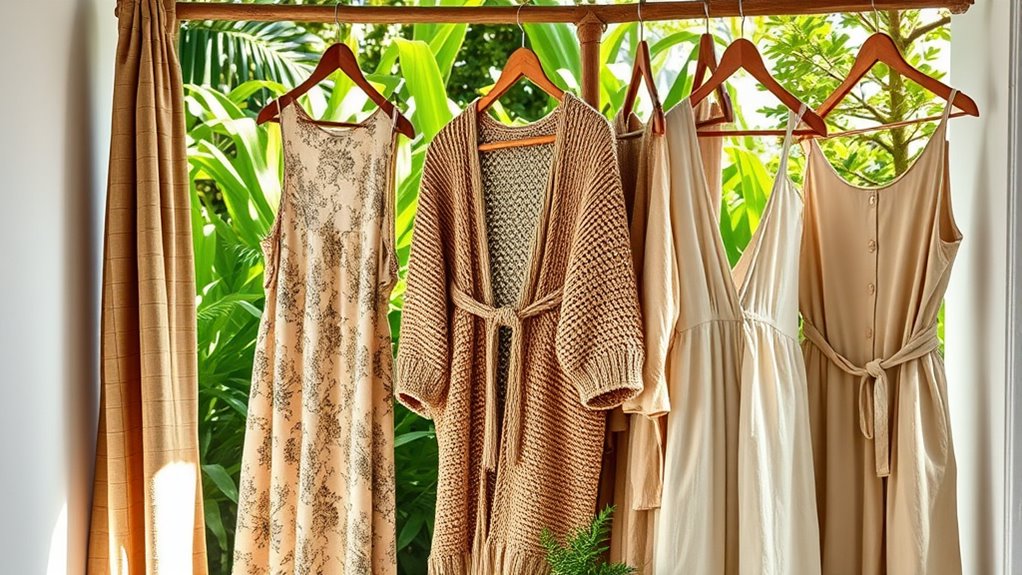
Investing in timeless, versatile pieces is key to building a long-lasting boho wardrobe. These pieces enhance wardrobe longevity by offering adaptable, stylish options that fit various occasions. Focus on sustainable fabrics like organic cotton, linen, and hemp, which guarantee durability and eco-friendliness. To maximize versatility, consider these essentials:
- Maxi dresses that can be dressed up or down
- Wide-legged pants for comfort and style
- Versatile kimonos perfect for layering
- Classic neutral tones and subtle prints to stay seasonally relevant
Choosing well-made garments from ethical brands further boosts their lifespan, reducing waste and supporting sustainable practices. By curating a capsule wardrobe of these timeless pieces, you’ll enjoy fashion that’s both stylish and eco-conscious for years to come.
Key Fabrics to Seek Out for Sustainable Boho Fashion
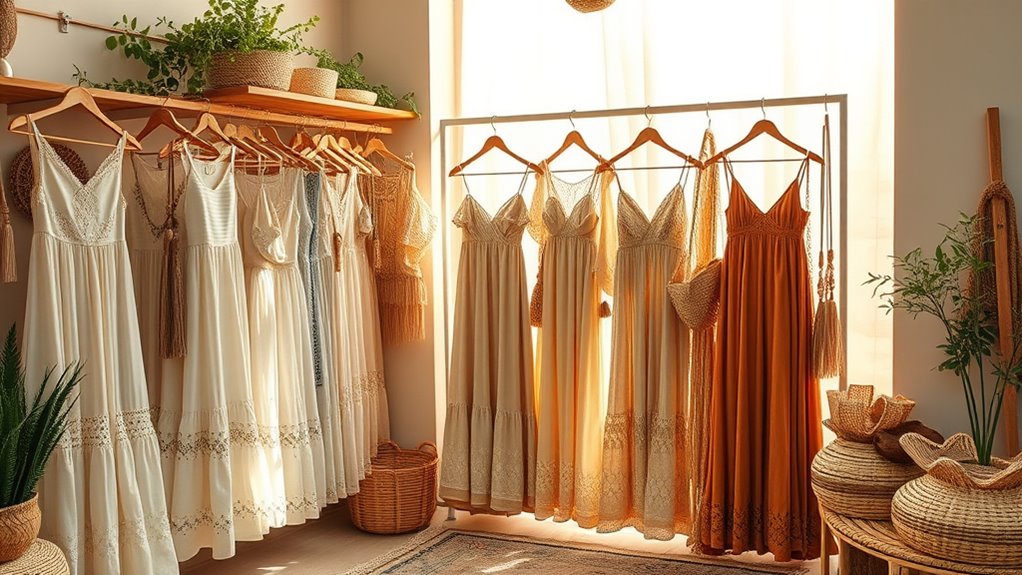
When choosing fabrics for your boho wardrobe, opt for natural and organic options that are gentle on the environment. Fabrics like organic cotton, linen, hemp, and bamboo offer sustainable benefits and reduce ecological impact. By prioritizing these eco-friendly choices, you can create stylish, conscious outfits that support a greener planet.
Natural Fiber Benefits
Natural fibers are essential for creating sustainable boho fashion because they offer eco-friendly alternatives to synthetic fabrics. These natural fibers, like organic cotton, linen, hemp, and bamboo, are biodegradable, which helps reduce environmental impact. Incorporating these fibers into your wardrobe supports sustainable textiles and minimizes pollution. Here are some key benefits:
- Organic cotton uses 91% less water and fewer chemicals than conventional cotton.
- Linen, from flax, needs minimal water and pesticides, perfect for warm-weather styles.
- Hemp requires no pesticides, grows rapidly, and uses minimal water.
- Bamboo fabric, when processed naturally, is biodegradable, moisture-wicking, and fast-growing.
Choosing these eco-friendly fibers helps you build a stylish, sustainable boho wardrobe that benefits the planet.
Eco-Friendly Fabric Choices
Choosing eco-friendly fabrics is essential for building a sustainable boho wardrobe. Natural fabrics like organic cotton, linen, hemp, and bamboo are biodegradable fabrics that offer eco-friendly fashion options. Organic cotton is grown without synthetic pesticides or fertilizers, providing softness and breathability perfect for boho styles. Linen, made from flax, uses considerably less water and chemicals than cotton, making it a great choice for warm-weather looks. Hemp is a highly sustainable crop that requires minimal water, no pesticides, and grows quickly, making its fabric an excellent low-impact textile. Bamboo fabric, when processed responsibly, is biodegradable, moisture-wicking, and fast-growing. By prioritizing these sustainable materials, you support eco-friendly fashion and reduce environmental harm while creating stylish, conscious boho outfits.
Notable Labels Pioneering Eco-Conscious Bohemian Styles

Numerous brands are leading the way in eco-conscious boho fashion by prioritizing sustainable materials and ethical practices. These sustainable brands focus on eco-friendly fabrics and transparent supply chains to create stylish, responsible pieces. Here are some notable labels:
- Reformation and Spell & The Gypsy use recycled textiles, organic cotton, and hemp, championing eco-friendly fabrics in their collections.
- People Tree and Amour Vert emphasize ethical fashion, ensuring fair trade practices and GOTS-certified production.
- Arnhem Clothing from Australia highlights biodegradable materials like Tencel and organic cotton, supporting slow fashion and local manufacturing.
- Tonlé and Pangaia innovate with recycled materials, upcycling textiles into affordable boho styles that reduce waste.
These brands exemplify how sustainable brands can combine style, ethics, and transparency in boho fashion.
The Benefits of Shopping Second-Hand and Vintage for Eco-Friendly Fashion
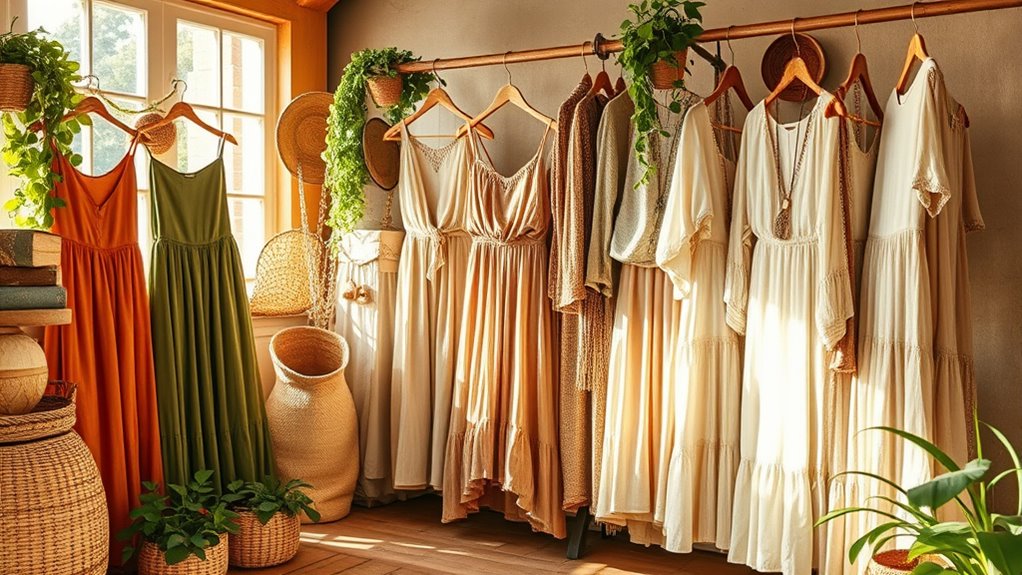
Shopping second-hand and vintage clothing offers a powerful way to make your wardrobe more eco-friendly while expressing your unique style. By choosing second-hand and vintage pieces, you extend the lifespan of garments, supporting circular fashion and reducing textile waste that would otherwise end up in landfills. Vintage items often showcase unique craftsmanship and sustainable fabrics, which are hard to find in fast fashion. This also lowers the demand for new clothing production, cutting water use, chemical pollution, and carbon emissions. Online platforms like Depop, Poshmark, and Etsy make finding eco-friendly vintage boho styles easy and accessible, encouraging conscious shopping habits. Upcycling and reusing pre-loved garments foster a sustainable approach, decreasing reliance on virgin materials and helping you build an individual, eco-conscious wardrobe.
Future Trends in Sustainable Boho Clothing and Responsible Consumption
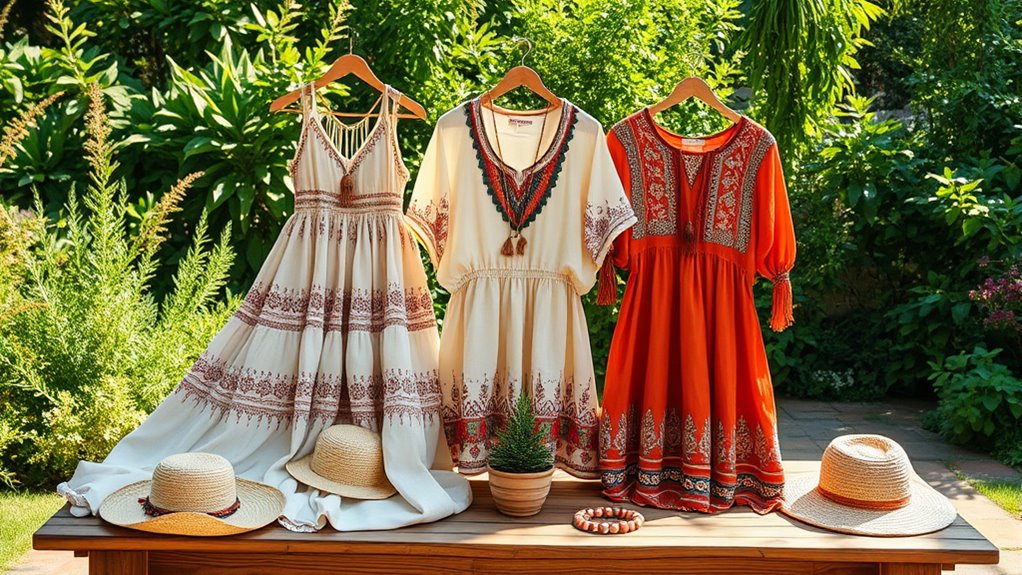
Have you noticed how sustainable boho fashion is evolving with innovative materials and practices? Future trends focus on making responsible consumption easier and more stylish. Here are four key developments:
- Recycled fabrics and biodegradable materials are becoming standard, reducing waste and environmental impact.
- Natural dyes and plant-based fabrics enable vibrant, eco-friendly pieces that align with your values.
- Supply chain transparency, supported by certifications like GOTS and B Corp, ensures accountability and ethical sourcing.
- Timeless styles crafted from innovative fibers such as hemp, bamboo, and Tencel promote durability and versatility.
These trends highlight a shift toward long-lasting, eco-conscious fashion that meets your desire for responsible shopping without sacrificing style.
How to Curate a Conscious Wardrobe With Ethical and Sustainable Brands
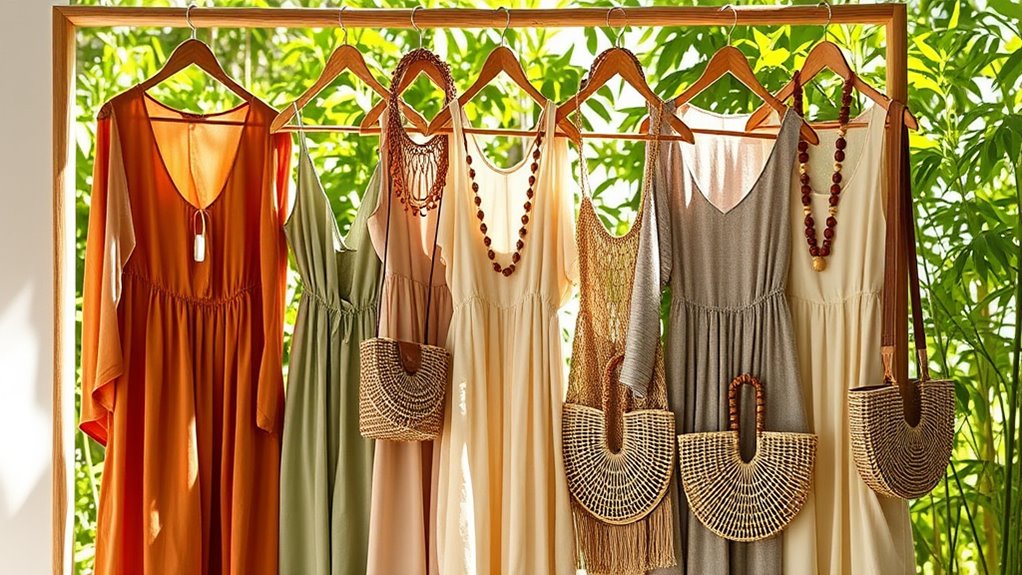
Curating a conscious wardrobe begins with choosing versatile pieces made from organic, recycled, or natural fabrics like hemp, Tencel, and organic cotton, ensuring your clothing is both sustainable and durable. Support ethical brands that prioritize transparent supply chains, fair trade certifications, and eco-friendly practices, such as GOTS, B Corp, or Fair Trade Certified labels. Incorporate vintage and upcycled clothing to reduce textile waste and add unique, handcrafted pieces. Invest in timeless high-quality essentials like maxi dresses, wide-legged pants, and natural fiber accessories that can be styled for multiple occasions. Prioritize local and small-batch brands to minimize your carbon footprint and promote ethical production practices throughout the supply chain. This approach helps you build a sustainable wardrobe rooted in eco-friendly fashion and ethical principles.
Frequently Asked Questions
What Is the Most Sustainable and Eco-Friendly Fabric?
You might wonder which fabric is the most sustainable and eco-friendly. Hemp stands out because it grows quickly, requires minimal water, and needs no pesticides, making it highly renewable. Linen and organic cotton are also great options, using fewer resources and avoiding harmful chemicals. Recycled fabrics are excellent too, reducing waste. Overall, hemp and recycled materials are among the best choices for eco-conscious fashion lovers like you.
What Is the Most Eco-Friendly Fashion Brand?
Imagine your wardrobe as a garden, thriving with mindful choices. You’re drawn to brands like Reformation and Patagonia, where sustainability blossoms through eco-friendly fabrics and transparent practices. These brands are like seeds of change, nurturing the planet with recycled materials, ethical manufacturing, and carbon neutrality. By supporting such companies, you become a gardener, cultivating a future where fashion and nature flourish side by side.
What Are the Best Boho Brands?
When choosing the best boho brands, you should look for those committed to sustainability and ethical practices. Reformation stands out with eco-friendly fabrics like organic cotton and recycled materials. Spell & The Gypsy offers long-lasting, conscious garments. People Tree prioritizes fair trade and transparency, while Arnhem Clothing uses sustainable fabrics and eco-friendly packaging. Tulle & Batiste supports slow fashion and local artisans, making these brands perfect for eco-conscious boho style.
Which Luxury Brands Are the Most Sustainable?
You want to know which luxury brands lead in sustainability. Brands like Stella McCartney use innovative, eco-friendly fabrics like regenerated nylon and organic cotton, maintaining high ethical standards. Gucci’s Gucci Equilibrium initiative incorporates recycled and organic materials, while Gabriela Hearst emphasizes circular design and transparent sourcing. Khaite sources natural fabrics such as organic cotton and linen. These brands prove that luxury and sustainability can go hand in hand, offering stylish, eco-conscious options.
Conclusion
By choosing natural fabrics, supporting ethical brands, and embracing vintage finds, you can craft a sustainable boho wardrobe that’s both stylish and kind to the planet. Think of it as your own personal renaissance—blending timeless charm with modern responsibility. Remember, every eco-conscious choice adds up, turning your fashion journey into a movement. So, go ahead, be the change you wish to see—your wardrobe and the Earth will thank you.
